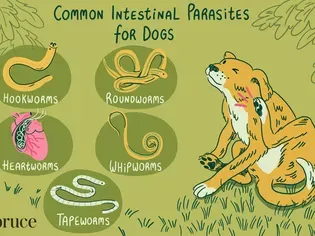Common Worms and Intestinal Parasites in Dogs
Updated on 04/26/24

Unveiling the Hidden Invaders: Common Worms and Intestinal Parasites in Dogs
Dogs, our beloved companions, can often harbor unseen guests that can cause a range of health issues – worms and intestinal parasites. These unwelcome visitors can negatively impact your dog's well-being, leading to discomfort, health complications, and even life-threatening conditions. In this comprehensive guide, we delve into the world of common worms and intestinal parasites that may reside within your furry friend, providing valuable information to safeguard their health.
Roundworms: The Ubiquitous Intestinal Dwellers
Roundworms, belonging to the genus Toxocara, are among the most prevalent intestinal parasites in dogs. These round, spaghetti-like worms reside in the small intestine, where they feed on the dog's food, depriving them of essential nutrients.
* Symptoms: Infected dogs may exhibit signs of weight loss, diarrhea, vomiting, and a dull or rough coat. In severe cases, roundworms can cause intestinal blockage, leading to life-threatening complications.
* Example: Toxocara canis, a common roundworm in dogs, can also infect humans, particularly children, causing visceral larva migrans – a condition characterized by abdominal pain, fever, and coughing.
Hookworms: Blood-Sucking Parasites
Hookworms, belonging to the Ancylostoma or Uncinaria species, are intestinal parasites that attach to the lining of the small intestine, feeding on the dog's blood. This blood loss can lead to anemia, weakness, and even death in severe infestations.
* Symptoms: Infected dogs may experience weakness, pale gums, diarrhea, and weight loss. Untreated hookworm infestations can result in severe anemia, requiring blood transfusions.
* Example: Ancylostoma caninum is a common hookworm in dogs that can also infect cats and humans, causing cutaneous larva migrans – a condition characterized by itchy, red skin lesions.
Tapeworms: Segmented Intruders
Tapeworms, including species like Taenia, Dipylidium, and Echinococcus, are segmented intestinal parasites that consist of a head, neck, and a chain of segments filled with eggs. These parasites attach to the lining of the small intestine, absorbing nutrients from the dog's food.
* Symptoms: Infected dogs may experience weight loss, diarrhea, and a dull or rough coat. Some tapeworm segments may be visible in the dog's feces or around the anus.
* Example: Dipylidium caninum is a common tapeworm in dogs that is transmitted through the ingestion of fleas. This tapeworm is less harmful than other species, causing mild gastrointestinal upset.
Whipworms: Persistent Intestinal Residents
Whipworms, belonging to the Trichuris species, are thin, whip-like parasites that reside in the large intestine. They feed on the lining of the intestine, causing inflammation and bleeding.
* Symptoms: Infected dogs may experience chronic diarrhea, weight loss, and a dull or rough coat. Whipworm infestations can lead to anemia and malnutrition.
* Example: Trichuris vulpis, a common whipworm in dogs, is highly resistant to environmental conditions, making it challenging to eliminate from infected animals.
Coccidia: Microscopic Intestinal Invaders
Coccidia are microscopic protozoan parasites that infect the cells lining the small intestine. They can cause intestinal damage, leading to diarrhea, weight loss, and dehydration.
* Symptoms: Infected dogs may experience diarrhea, vomiting, lethargy, and loss of appetite. Coccidia infestations can be particularly severe in young puppies, causing significant health complications.
* Example: Isospora canis is a common coccidia species that infects dogs, causing mild to severe intestinal upset.
Giardia: Waterborne Intestinal Parasite
Giardia is a protozoan parasite that lives in the small intestine. It is transmitted through contact with contaminated water or soil.
* Symptoms: Infected dogs may experience watery diarrhea, vomiting, and weight loss. Giardia infestations can lead to dehydration and malnutrition.
* Example: Giardia lamblia is a common giardia species that can infect both dogs and humans, causing gastrointestinal distress.
Prevention and Treatment: Keeping Your Dog Parasite-Free
Protecting your dog from worms and intestinal parasites is crucial for their well-being. Implementing the following measures can help prevent and control these parasites:
* Regular Deworming: Administering a broad-spectrum dewormer to your dog as recommended by your veterinarian is essential for eliminating existing parasites and preventing re-infestation.
* Fecal Testing: Regular fecal exams can detect the presence of parasite eggs or cysts in your dog's stool, allowing for prompt treatment.
* Flea and Tick Control: Fleas and ticks can transmit tapeworms and other parasites. Regularly treat your dog with effective flea and tick prevention products.
* Hygiene Practices: Maintaining a clean living environment for your dog, including regular cleaning of food and water bowls, and picking up and disposing of feces promptly, can help reduce the risk of parasite exposure.
* Access to Clean Water: Provide your dog with access to clean, fresh water at all times to minimize the risk of ingesting waterborne parasites like Giardia.
Conclusion: A Parasite-Free Life for Your Dog
By understanding the common worms and intestinal parasites that can affect your dog and implementing preventive measures, you can safeguard their health and well-being. Regular deworming, fecal testing, and good hygiene practices are essential to keep these unwelcome guests at bay. Remember, a parasite-free dog is a happy and healthy dog.
Explore More Pets

Basic Training
Puppy and Baby Introductions

Working Dog Breeds
All About Search and Rescue Dogs

Dog Treatments
Puppy Vaginitis: Signs, Causes and Treatment

Dog Adoption
After More Than 1,200 Days in the Shelter, Coco Goes Home

Basic Training
How to Train Your Puppy to Go on Potty Pads

Hybrid Dog Breeds
The Difference Between a Mutt, Mixed Breed, or Designer Dog?

Dog Treatments
Nail Problems in Dogs

Puppies
7 Reasons Why Two Dogs Are Better Than One